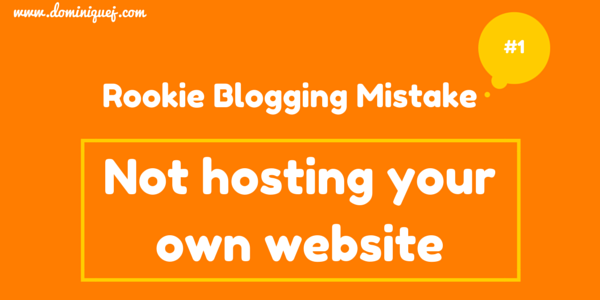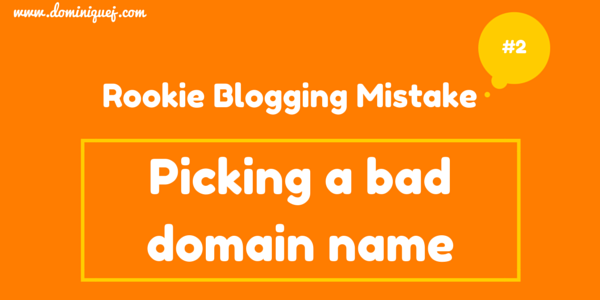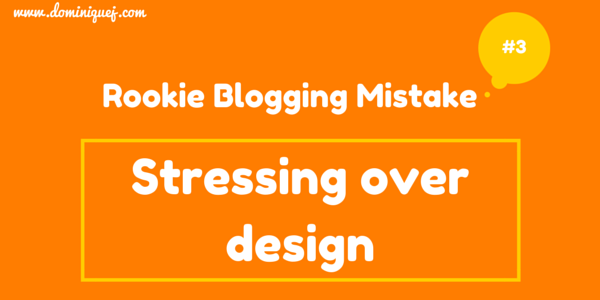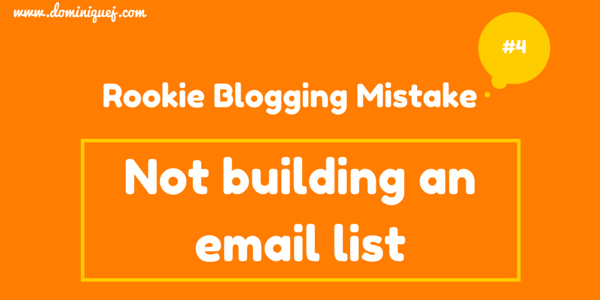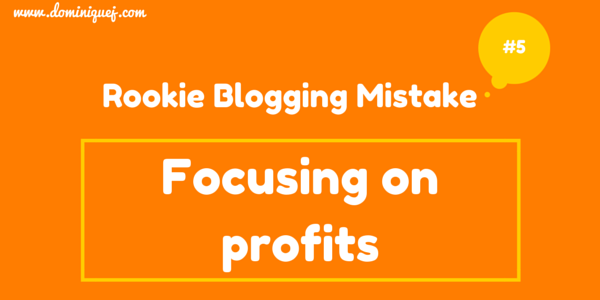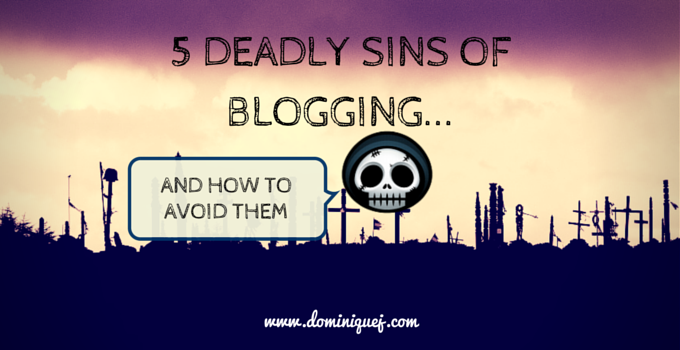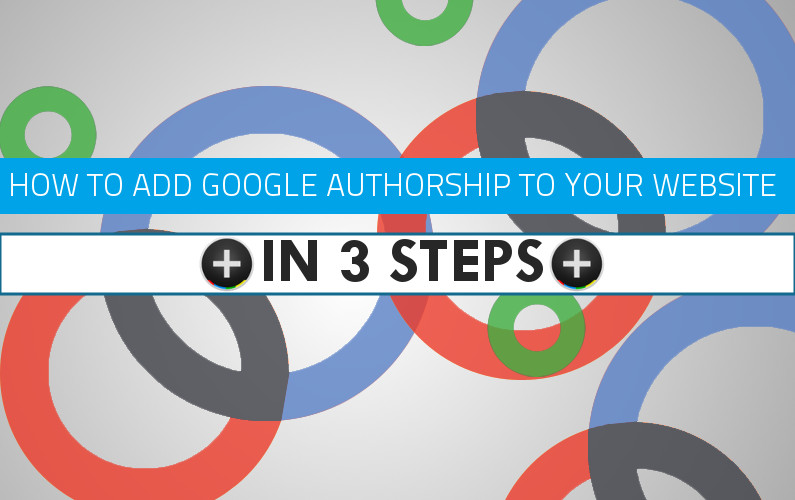If you’re like me when I first started blogging, there’s a good chance that you jumped right in with no idea of what you were doing. All you knew is that you wanted to blog, so you did it. I like the initiative, but I also know that you’re going to run into some roadblocks along the way. You’re probably asking yourself questions like
what’s this hosting stuff all about?
how do I setup my domain name?
what in the world is WordPress?
Don’t worry, you’re not alone. I won’t be able to teach you everything you need help with in just this single post, but I can help you avoid some of the biggest mistakes that myself and plenty of others have made while getting started with blogging. My hope is that you’ll get off to a much better start, and be able to get around some of the mistakes that waste your time, and even drive some people to completely give up on blogging altogether. So without further ado, let’s get to it.
Rookie Blogging Mistake #1: Not Hosting Your Own Website
The very first blog I ever had was a Blogspot blog. It was myusername.blogspot.com. Luckily, I didn’t put much effort or time into that piece of crap, and a few years later I discovered how to set up my own self hosted blog.
For those of you completely confused about what I’m talking about, here’s what it boils down to. There are two basic ways most people start a blog.
- Hosted: Sites like WordPress.com, Blogger/Blogspot, Tumblr, etc.
- Self Hosted: Buying your own web hosting and domain, and setting up your site there, typically using a Content Management System like WordPress.
With a hosted blog, that means that your blog lives on another website. Your blog’s URL is generally www.yourblog.anotherwebsite.com. You don’t have the freedom to completely customize your design in most cases, and there are a lot of restrictions on what you can do on them.
A self hosted blog on the other hand, is when you have your own hosting account through a web host company (I use Hostgator), your own domain name, and you have complete control over every aspect of your site.
Here’s how I like to think about it. A hosted site is like living with your parents, and a self-hosted site is living on your own. With the hosted blog, the other site pays the expenses of keeping your blog up, but you have to play by their rules. With a self hosted blog, you have to pay for everything, but you get independence and the freedom to do whatever you want.
I advise people to avoid starting out with hosted websites for a few different reasons. For one, branding. When your blog is hosted on another site, your URL will always include the other site. It’s much easier to tell people my site is dominiquej.com than dominiquej.wordpress.com.
The other big reason is the ability to scale. I see a lot of sites recommending people start out with one of the free hosted blog platforms at first. And then once your site starts to build up, switch to a self hosted blog. Don’t take that advice. There are a bunch of reasons why it’s a bad idea, but one of the most important is Search Engine Optimization.
When you start out with a hosted blog, all of the posts you’re creating and the backlinks you’re getting will all be credited to that URL (yoursite.wordpress.com). Once you make the decision to switch over to a self hosted blog, you’re losing out on a lot of the work that you did over the months or years. It’s a MUCH better decision to start off with a self hosted site from the get-go, and build up everything from that domain.
One of the main reasons people use the free blogging sites is because they’re afraid to invest money into blogging. But it’s actually a lot cheaper than you think. Your can pick up a domain name for about $10, and hosting for around $10/month. You can even get started for less than a dollar on Hostgator with my coupon code – DominiqueJ. So no excuses!
Rookie Blogging Mistake #2: Picking A Bad Domain Name
I don’t care what anyone says, you should always try to get a “.com” domain name. Unless you’re absolutely desperate and can’t come up with anything else, always go for the .com. Sure, .net, .org, and other extensions are used a lot, but the .com should always be your first priority.
Here are some other tips for choosing a domain name:
- Short and sweet: Your domain name should be easy to remember. Limit it to 3 or fewer words when possible.
- Avoid numbers: Numbers can get messy. People will have to know whether to spell out F-I-V-E or just use 5.
- Get variations: If you’re branding your company (i.e. Nike) then grab the .net, .org, .co, and any other ones you want so that nobody takes them.
- Easy to type: This isn’t the late 90’s, try not to replace your S’s with Z’s
Your domain name is important because you’ll be using the same one for a long time, so you want to make sure you pick a good one. The last thing you want is to have your blog active for about 2 years and have to change it because you absolutely hate it now or used something trendy (remember when everything was called iSomething?). Switching domains isn’t a minor task if you’ve built up your site a lot. Do it right in the beginning, and avoid a headache later on.
Rookie Blogging Mistake #3: Stressing Over Design
Your site’s design is important, but it shouldn’t delay your launch. There’s a good chance that your blog is going to go through several redesigns over the years (I’ve changed the design of this site at least 5 times over the past few years), so don’t get married to the initial design.
Here’s what I recommend. If you’re using WordPress, pick up a nice looking theme. No need to get a custom made site right away. This is actually a really big misconception people have about blogging or making a website in general. Since a lot of your favorite websites have these really professional, mind-blowingly aesthetic custom made websites, it’s easy to assume that every site is custom made. The reality is that’s far from the truth.
There are plenty of great free and premium (paid) WordPress themes out there that will keep your site from looking like it was made in the 90’s, even if you have absolutely no coding skills. I use, and recommend MyThemeshop. You can get a theme for 50% off with my coupon code – Dominique.
I do recommend learning some basic CSS though just in case you want to customize minor things without having to pay someone. The great thing about WordPress is that their are tons of YouTube videos and active communities that can pretty much show you how to do anything you need to do. W3 Schools is super useful to help you learn anything coding related.
Whatever you do, don’t fall into the trap of paying for a cheap custom made website. Chances are the final product will be:
- Poorly coded
- Not actually custom made
If you ever do end up looking to have a custom blog design made, make sure you go to a professional that knows what they’re doing in terms of design and SEO. Coding and the structure of your site play a huge role in SEO, and there are a lot of designers out there that pay no attention to SEO while designing your blog. A custom website design is a big investment, so choose wisely.
Rookie Blogging Mistake #4: Not Building An Email List
When someone comes to your blog, sees something that interests them, and consumes your content, there’s a pretty good chance they’ll never return back to your site. In today’s world where there is soooo much content available, fewer people have loyalty to any particular site. This next comment is pretty important, so pay attention! People don’t search for blogs, they search for information. (you’d better tweet that knowledge bomb I just dropped on you)
[Tweet “People don’t search for blogs, they search for information”]
BOOM! That was powerful. And it’s the reason why email lists are so important.
You see, after someone gets what they came for from your blog, they leave and move on. BUT, if you give them some type of incentive, you have a much higher chance of them coming back.
Let’s take it back to the days before Facebook and Twitter controlled everybody’s lives. Before mobile and email marketing were popular. Say you had a craving for some Chinese food one night. You don’t always get Chinese, but hey, it’s Friday night and the weekend is coming up. So you find a spot near your house that you’ve never been, place your order, and then go pick it up. You get home, devour that meal like it’s nobody’s business, and sit back and say to yourself “man, that was good”. And low and behold, the restaurant owner included a menu with COUPONS inside! So next week, you order again.
Here’s what happened. You enjoyed the food. But, even though it was good, you more than likely wouldn’t go back to the restaurant until you were hungry for some Chinese food again. BUT, since the restaurant was wise enough to slip you a coupon (and who among us can’t resist the temptation of a good coupon?), now you’re more likely to come back when you’re hungry, not just when you specifically crave Chinese food. See the difference?
That coupon made the Chinese food restaurant more of a priority for you, and kept it in your mind. So next weekend when you’re hungry and forget to cook, you have that coupon in your kitchen to remind you to go back.
Fast forward to today, and the same general concept applied to email lists. In fact, email lists have made it even easier for you to stay in touch with your audience or customers, because you can reach out to them any time.
Let’s look at another scenario. You have a blog about Yoga. Someone stumbles across a post you made about what to look for in a good Yoga mat while they were searching Google for a good mat. Remember, they’ve come to your site for a specific purpose – Yoga mats. While reading through your blog post, they got the info they needed. And then as they get to the end of the post, they see a widget at the bottom of your article that says “Sign up below to download our Ultimate Yoga Guide For Beginners”. They’re new to Yoga, so they signed up and got your guide.
That person who came to your site for a specific reason, and probably never would have returned to your blog after they got what they needed, just turned into one of your followers. Now you have a way to get them back to your site!
And that, my friend, is why you need an email list from the very beginning.
Rookie Blogging Mistake #5: Focusing On Profits
I’m going to be 100% honest here. The initial “draw” of blogging for me was the fact that it could earn me money. That’s mainly because I first found out about blogging through those “make money blogging” sites and products. Basically, I didn’t know any better. But now I do know better, and I’m passing on the knowledge to you so that you don’t fall into the same trap that I did. It’s the exact same trap that thousands of people fall into when they discover blogging.
Don’t get me wrong, if your overall goal is to turn blogging into a full time business for yourself, or to earn some extra cash on the side, then go for it. That’s an awesome goal. But my point is that your sole purpose for blogging shouldn’t be to make money. And here’s why.
When making money is your main goal, everything you do on your blog will revolve around that. You’ll be more likely to throw all kinds of ads all over your site for products that you’ve never even used and can’t genuinely recommend. You’re more likely to give up after a couple of months because you haven’t made any money. And most importantly, the quality of your content takes a backseat to revenue.
Your focus should always be on providing the highest quality content possible. Everything else comes after that. With the exception of some entertainment blogs (shots fired!), the quality of your content is what’s going to help you grow your blog. I didn’t make any money blogging until I stopped caring about making money, and just started putting out some freakishly awesome content. Then everything built off of that.
Instead of asking yourself “how can I make money from this blog?”, ask yourself “how can I create better content?”
Nobody’s Perfect
Making mistakes is normal. Even after reading this, you might find yourself making some of these exact mistakes (hopefully not though). Blogging is easy. Having a successful blog though, takes hard work and you’re going to screw up every now and then. When you mess something up, don’t worry. Just fix the mistake, bounce back, and keep it moving.
What are some of the biggest mistakes you’ve made as a blogger? Let me know in the comments or tweet me!

